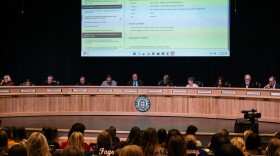Yellow shirted union workers clapped and cheered as their leaders stood at the podium. The steps up to the Labor Council's Mission Valley offices were packed with children earlier this week. "Protect my mommy's health care" read one sign. Who pays for health care is the main reason 10,000 local union workers do not have a new contract.
"We want our health care. We want you to protect our health care," said Mickey Kasparian, president of the United Food and Commercial Workers Union Local 135. "So my challenge is to the employers. Get serious. Get real at the table. Or you will suffer the consequences of 192,000 people in San Diego County."
The 192,000 people are union members represented by the AFL-CIO Labor Council. Those workers belong to more than 30 different unions and those people are pledging to help if the grocery workers walk off the job.
"And we're going to provide the list of union places that people can go," said Lorena Gonzalez, secretary and treasurer of the AFL-CIO Labor Council. "Places that do provide health care and benefits to their workers. People that do provide a good level of service and we're going to encourage our members to show at those places rather than these big three."
Union officials want to avoid the brutal grocery store walkout that began in 2003 and lasted into 2004. Industry analysts said Vons, Ralph's and Albertson's lost about $2 billion worth of business, and the stores never regained their market share once the dispute was settled. But in the end, the grocers got most of the contract demands they asked for.
Some health care costs shifted from the stores to the workers and new employees got far fewer benefits than those already working.
These contract talks are coming at a difficult time for the stores and the 60,000 union workers, said Ruben Garcia, a labor law attorney who teaches at San Diego's Cal Western School of Law. The recession has hammered the economy and workers have had no appreciable wage gains in several years.
"That is certainly putting a lot of strain economically on the workers in negotiations and the companies too are facing increased competition and decreased revenue," said Garcia.
Workers may be eyeing the improving economic situation with some optimism, while the stores are looking at increasing competition in the the Southern California region. Even so, Garcia said there there is probably some saber rattling going on.
"Strikes, they are calculated and strategized for the workers and for management. They are not greatly painful. They are all about strategy at this point, on both sides, " according to Garcia.
Representatives for the grocery chains did not return calls seeking comment. However, in a written statement earlier this week, the grocery chains called their health care proposals fair.
The companies said the proposal offers health benefits to those working as few as 16 hours a week. The businesses also said the unions shouldn't be talking about a strike because contract talks are still underway.
Talking isn't enough said UFCW Local 135 President Mickey Kasparian. He said the companies stopped paying for worker benefits when the old contract expired in March.
"Our benefits fund is being depleted every day because our contract's expired. So just to say, let's keep negotiating until we get something done, puts our member's benefits at risk," said Kasparian. "Even while we continue to bargain. So its very important that we make progress, get a deal. And resolve this. We don't want to repeat 2003 and 2004."
Both sides are working with a federal mediator in an effort to reach an agreement. Neither side is talking about the next round of bargaining will happen.






